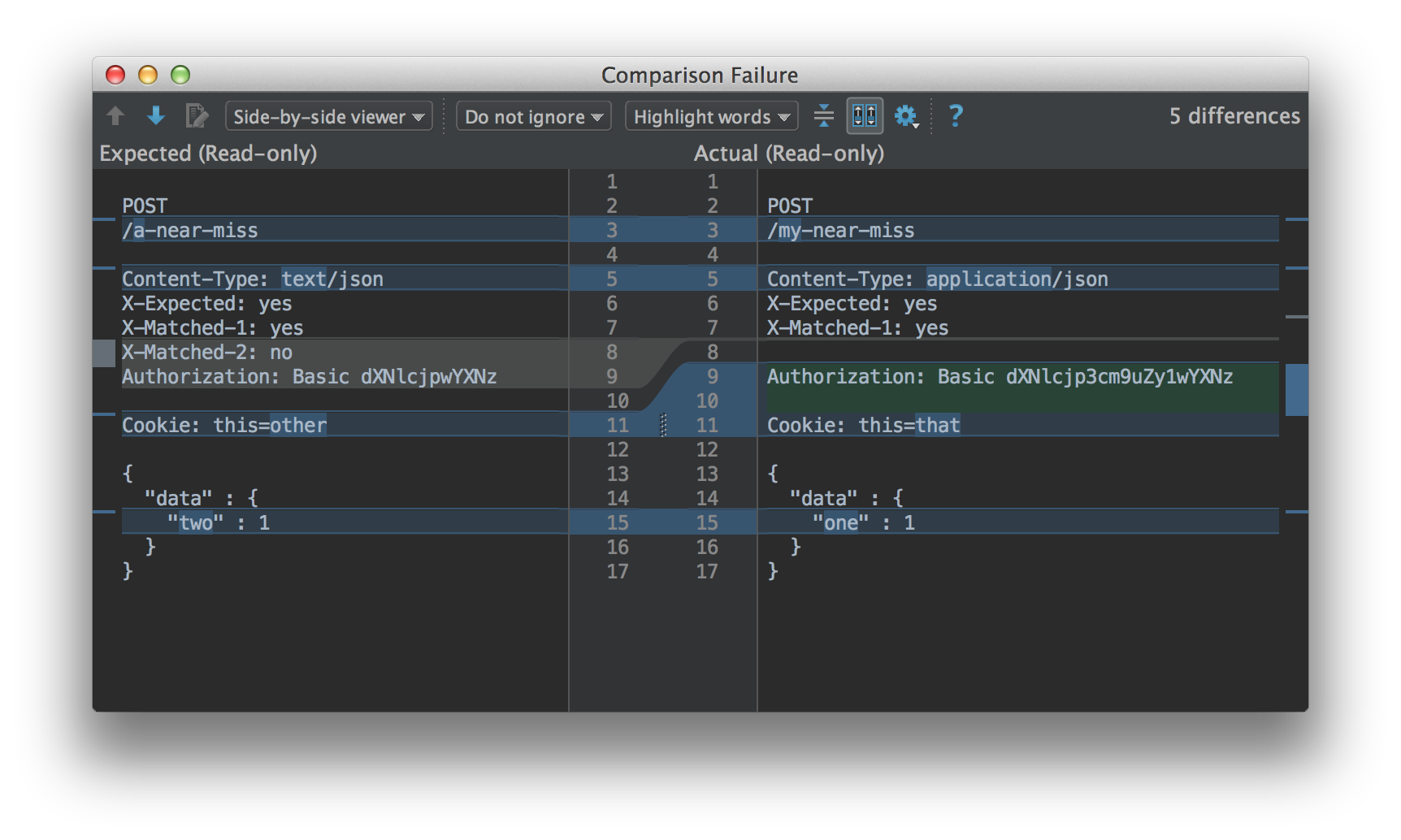Verifying
The WireMock server records all requests it receives in memory (at least until it is reset). This makes it possible to verify that a request matching a specific pattern was received, and also to fetch the requests’ details.
Verifying and querying requests relies on the request journal, which is an in-memory log of received requests. This can be disabled for load testing - see the Configuration section for details.
Like stubbing, verification also uses WireMock’s Request Matching system to filter and query requests.
Verification failures, console output and IntelliJ #
When verifying via the Java API all failed verifications will result in a VerificationException being thrown. 
The message text in the exception is formatted to enable IntelliJ’s failure comparison view: 
Verifying in Java #
To verify that a request matching some criteria was received by WireMock at least once:
verify(postRequestedFor(urlEqualTo("/verify/this"))
.withHeader("Content-Type", equalTo("text/xml")));
The criteria part in the parameter to postRequestedFor() uses the same builder as for stubbing, so all of the same predicates are available. See Stubbing for more details.
To check for a precise number of requests matching the criteria, use this form:
verify(3, postRequestedFor(urlEqualTo("/three/times")));
Or you can use some more advanced comparison operators:
verify(lessThan(5), postRequestedFor(urlEqualTo("/many")));
verify(lessThanOrExactly(5), postRequestedFor(urlEqualTo("/many")));
verify(exactly(5), postRequestedFor(urlEqualTo("/many")));
verify(moreThanOrExactly(5), postRequestedFor(urlEqualTo("/many")));
verify(moreThan(5), postRequestedFor(urlEqualTo("/many")));
Verifying via the JSON + HTTP API #
There isn’t a direct JSON equivalent to the above Java API. However, it’s possible to achieve the same effect by requesting a count of the number of requests matching the specified criteria (and in fact this is what the Java method does under the hood).
This can be done by posting a JSON document containing the criteria to http://<host>:<port>/__admin/requests/count:
{
"method": "POST",
"url": "/resource/to/count",
"headers": {
"Content-Type": {
"matches": ".*/xml"
}
}
}
A response of this form will be returned:
{ "count": 4 }
Querying the request journal #
Getting all requests #
All requests received by WireMock since the last reset can be fetched, along with additional data about whether the request was matched by a stub mapping and the resulting response definition.
In Java:
List<ServeEvent> allServeEvents = getAllServeEvents();
And via the HTTP API by sending a GET to http://<host>:<port>/__admin/requests:
{
"requests": [
{
"id": "95bd9a40-82d4-47ce-9383-25a9e972f05d",
"request": {
"url": "/received-request/7",
"absoluteUrl": "http://localhost:51490/received-request/7",
"method": "GET",
"clientIp": "127.0.0.1",
"headers": {
"Connection": "keep-alive",
"User-Agent": "Apache-HttpClient/4.5.1 (Java/1.8.0_45)",
"Host": "localhost:51490"
},
"cookies": {},
"browserProxyRequest": false,
"loggedDate": 1475495213275,
"bodyAsBase64": "",
"body": "",
"loggedDateString": "2016-10-03T11:46:53Z"
},
"responseDefinition": {
"status": 200,
"body": "This was matched"
},
"wasMatched": true
},
{
"id": "aa1a4250-f87c-4a17-82e3-79c83441ce03",
"request": {
"url": "/received-request/6",
"absoluteUrl": "http://localhost:51490/received-request/6",
"method": "GET",
"clientIp": "127.0.0.1",
"headers": {
"Connection": "keep-alive",
"User-Agent": "Apache-HttpClient/4.5.1 (Java/1.8.0_45)",
"Host": "localhost:51490"
},
"cookies": {},
"browserProxyRequest": false,
"loggedDate": 1475495213268,
"bodyAsBase64": "",
"body": "",
"loggedDateString": "2016-10-03T11:46:53Z"
},
"responseDefinition": {
"status": 404,
"transformers": [],
"fromConfiguredStub": false,
"transformerParameters": {}
},
"wasMatched": false
}
],
"meta": {
"total": 2
},
"requestJournalDisabled": false
}
Filtering events #
Optionally the results can be filtered to those occuring after a specififed (ISO8601) date-time. Also, the result set can optionally be limited in size e.g. to return the most recent three results after the 7th of June 2016 12pm send: GET http://localhost:8080/__admin/requests?since=2016-06-06T12:00:00&limit=3
Results can also be filtered to include only unmatched requests via a query parameter:
GET http://localhost:8080/__admin/requests?unmatched=true
In Java:
List<ServeEvent> serveEvents = getAllServeEvents(ServeEventQuery.ALL_UNMATCHED);
Likewise, the results can be filtered to include only requests matching a specific stub ID:
GET http://localhost:8080/__admin/requests?matchingStub=59651373-6deb-4707-847c-9e8caf63266e
In Java:
List<ServeEvent> serveEvents =
getAllServeEvents(ServeEventQuery.forStubMapping(myStubId));
Criteria queries #
The request journal can also be queried, taking a request pattern as the filter criteria. In Java:
List<LoggedRequest> requests = findAll(putRequestedFor(urlMatching("/api/.*")));
And in JSON + HTTP by posting a criteria document (of the same form as for request counting) to http://<host>:<port>/__admin/requests/find, which will return a response like this:
{
"requests": [
{
"url": "/my/url",
"absoluteUrl": "http://mydomain.com/my/url",
"method": "GET",
"headers": {
"Accept-Language": "en-us,en;q=0.5",
"User-Agent": "Mozilla/5.0 (Macintosh; Intel Mac OS X 10.6; rv:9.0) Gecko/20100101 Firefox/9.0",
"Accept": "image/png,image/*;q=0.8,*/*;q=0.5"
},
"body": "",
"browserProxyRequest": true,
"loggedDate": 1339083581823,
"loggedDateString": "2012-06-07 16:39:41"
},
{
"url": "/my/other/url",
"absoluteUrl": "http://my.other.domain.com/my/other/url",
"method": "POST",
"headers": {
"Accept": "text/plain",
"Content-Type": "text/plain"
},
"body": "My text",
"browserProxyRequest": false,
"loggedDate": 1339083581823,
"loggedDateString": "2012-06-07 16:39:41"
}
]
}
Removing items from the journal #
By ID #
An individual journal event can be removed via the Java API:
removeServeEvent(id);
Or via the HTTP API by issuing a DELETE to http://<host>:<port>/__admin/requests/{id}.
By criteria #
Events can also be removed from the request journal by criteria (in the same manner as for finding them described in Criteria queries).
Using the Java DSL:
removeServeEvents(putRequestedFor(urlMatching("/api/.*")
.withHeader("X-Trace-Id", equalTo("123"))));
Or via the HTTP API:
POST http://<host>:<port>/__admin/requests/remove
{
"method": "PUT",
"urlPattern": "/api/.*",
"headers": {
"X-Trace-Id": {
"equalTo": "123"
}
}
}
By stub metadata #
In situations where it isn’t possible to precisely identify log events for removal from request attributes alone, the metadata associated with stubs matching requests can be used for selection. For instance, your test code might create stubs tagged with test case identifiers, then use these to clean up events created by the test:
stubFor(get("/api/dosomething/123")
.withMetadata(metadata()
.list("tags", "test-57")
));
testClient.get("/api/dosomething/123");
List<ServeEvent> removedServeEvents = removeEventsByStubMetadata(matchingJsonPath("$.tags[0]", equalTo("test-57")));
POST /__admin/requests/remove-by-metadata
{
"matchesJsonPath" : {
"expression" : "$.tags[0]",
"equalTo" : "test-57"
}
}
For more info about stub metadata see Stub Metadata
Resetting the request journal #
The request log can be reset at any time. If you’re using either of the JUnit rules this will happen automatically at the start of every test case. However you can do it yourself via a call to WireMock.resetAllRequests() in Java or sending a DELETE request to http://<host>:<port>/__admin/requests.
Finding unmatched requests #
To find all requests which were received but not matched by a configured stub (i.e. received the default 404 response) do the following in Java:
List<LoggedRequest> unmatched = WireMock.findUnmatchedRequests();
To find unmatched requests via the HTTP API, make a GET request to /__admin/requests/unmatched:
GET http://localhost:8080/__admin/requests/unmatched
{
"requests" : [ {
"url" : "/nomatch",
"absoluteUrl" : "http://localhost:8080/nomatch",
"method" : "GET",
"clientIp" : "0:0:0:0:0:0:0:1",
"headers" : {
"User-Agent" : "curl/7.30.0",
"Accept" : "*/*",
"Host" : "localhost:8080"
},
"cookies" : { },
"browserProxyRequest" : false,
"loggedDate" : 1467402464520,
"bodyAsBase64" : "",
"body" : "",
"loggedDateString" : "2016-07-01T19:47:44Z"
} ],
"requestJournalDisabled" : false
}
Near misses #
“Near Misses” are enabled by the new “distance” concept added to the matching system. A near miss is essentially a pairing of a request and request pattern that are not an exact match for each other, that can be ranked by distance. This is useful when debugging test failures as it is quite common for a request not to be matched to a stub due to a minor difference e.g. a miscapitalised character.
Near misses can either represent the closest stubs to a given request, or the closest requests to a given request pattern depending on the type of query submitted.
To find near misses representing stub mappings closest to the specified request in Java:
List<NearMiss> nearMisses = WireMock.findNearMissesFor(myLoggedRequest);
To do the same via the HTTP API:
POST /__admin/near-misses/request
{
"url": "/actual",
"absoluteUrl": "http://localhost:8080/actual",
"method": "GET",
"clientIp": "0:0:0:0:0:0:0:1",
"headers": {
"User-Agent": "curl/7.30.0",
"Accept": "*/*",
"Host": "localhost:8080"
},
"cookies": {},
"browserProxyRequest": false,
"loggedDate": 1467402464520,
"bodyAsBase64": "",
"body": "",
"loggedDateString": "2016-07-01T19:47:44Z"
}
will return a response like:
{
"nearMisses": [
{
"request": {
"url": "/actual",
"absoluteUrl": "http://localhost:8080/nomatch",
"method": "GET",
"clientIp": "0:0:0:0:0:0:0:1",
"headers": {
"User-Agent": "curl/7.30.0",
"Accept": "*/*",
"Host": "localhost:8080"
},
"cookies": {},
"browserProxyRequest": false,
"loggedDate": 1467402464520,
"bodyAsBase64": "",
"body": "",
"loggedDateString": "2016-07-01T19:47:44Z"
},
"stubMapping": {
"uuid": "42aedcf2-1f8d-4009-ac7b-9870e4ab2316",
"request": {
"url": "/expected",
"method": "GET"
},
"response": {
"status": 200
}
},
"matchResult": {
"distance": 0.12962962962962962
}
}
]
}
To find near misses representing stub mappings closest to the specified request in Java:
List<NearMiss> nearMisses = WireMock.findNearMissesFor(
getRequestedFor(urlEqualTo("/thing-url"))
.withRequestBody(containing("thing"))
);
The equivalent via the HTTP API:
POST /__admin/near-misses/request-pattern
{
"url": "/almostmatch",
"method": "GET"
}
will return a response like:
{
"nearMisses": [
{
"request": {
"url": "/nomatch",
"absoluteUrl": "http://localhost:8080/nomatch",
"method": "GET",
"clientIp": "0:0:0:0:0:0:0:1",
"headers": {
"User-Agent": "curl/7.30.0",
"Accept": "*/*",
"Host": "localhost:8080"
},
"cookies": {},
"browserProxyRequest": false,
"loggedDate": 1467402464520,
"bodyAsBase64": "",
"body": "",
"loggedDateString": "2016-07-01T19:47:44Z"
},
"requestPattern": {
"url": "/almostmatch",
"method": "GET"
},
"matchResult": {
"distance": 0.06944444444444445
}
}
]
}
As a convenience you can also find the top 3 near misses for every unmatched request:
List<NearMiss> nearMisses = WireMock.findNearMissesForAllUnmatched();
To do the same via the HTTP API, issue a GET to /__admin/requests/unmatched/near-misses, which will produce output of the same form as for the query for near misses by request.
